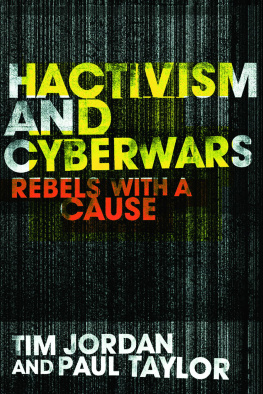Jordan Tim - Hacktivism and Cyberwars
Here you can read online Jordan Tim - Hacktivism and Cyberwars full text of the book (entire story) in english for free. Download pdf and epub, get meaning, cover and reviews about this ebook. City: London, year: 2004, publisher: Routledge, genre: Politics. Description of the work, (preface) as well as reviews are available. Best literature library LitArk.com created for fans of good reading and offers a wide selection of genres:
Romance novel
Science fiction
Adventure
Detective
Science
History
Home and family
Prose
Art
Politics
Computer
Non-fiction
Religion
Business
Children
Humor
Choose a favorite category and find really read worthwhile books. Enjoy immersion in the world of imagination, feel the emotions of the characters or learn something new for yourself, make an fascinating discovery.
- Book:Hacktivism and Cyberwars
- Author:
- Publisher:Routledge
- Genre:
- Year:2004
- City:London
- Rating:4 / 5
- Favourites:Add to favourites
- Your mark:
- 80
- 1
- 2
- 3
- 4
- 5
Hacktivism and Cyberwars: summary, description and annotation
We offer to read an annotation, description, summary or preface (depends on what the author of the book "Hacktivism and Cyberwars" wrote himself). If you haven't found the necessary information about the book — write in the comments, we will try to find it.
Hacktivism and Cyberwars — read online for free the complete book (whole text) full work
Below is the text of the book, divided by pages. System saving the place of the last page read, allows you to conveniently read the book "Hacktivism and Cyberwars" online for free, without having to search again every time where you left off. Put a bookmark, and you can go to the page where you finished reading at any time.
Font size:
Interval:
Bookmark:

Hacktivism and Cyberwars
As global society becomes more and more dependent, politically and economically, on the flow of information, the power of those who can disrupt and manipulate that flow also increases. In Hacktivism and Cyberwars: Rebels with a cause? Tim Jordan and Paul A. Taylor provide a detailed history of hacktivism's evolution from early hacking culture to its present-day status as the radical face of online politics. They describe the ways in which hacktivism has re-appropriated hacking techniques to create an innovative new form of political protest. A full explanation is given of the different strands of hacktivism and the cyberwars it has created, ranging from such avant-garde groups as the Electronic Disturbance Theatre to more virtually focused groups labelled the digitally correct. The full social and historical context of hacktivism is portrayed to take into account its position in terms of new social movements, direct action and its contribution to the globalisation debate. This book provides an important corrective flipside to mainstream accounts of e-commerce and broadens the conceptualisation of the Internet to take into full account the other side of the digital divide.
Tim Jordan is a Lecturer in Sociology at the Open University and Paul A. Taylor is a Senior Lecturer in the Institute for Communication Studies at the University of Leeds.
Hacktivism and
Cyberwars
Rebels with a cause?
Tim Jordan and Paul A. Taylor

First published 2004
by Routledge
11 New Fetter Lane, London EC4P 4EE
Simultaneously published in the USA and Canada
by Routledge
29 West 35th Street, New York, NY 10001
Routledge is an imprint of the Taylor & Francis Group
2004 Tim Jordan and Paul A. Taylor
Typeset in Garamond by
Keystroke, Jacaranda Lodge, Wolverhampton
Printed and bound in Great Britain by
TJ International Ltd, Padstow, Cornwall
All rights reserved. No part of this book may be reprinted or reproduced or utilised in any form or by any electronic, mechanical, or other means, now known or hereafter invented, including photocopying and recording, or in any information storage or retrieval system, without permission in writing from the publishers.
British Library Cataloguing in Publication Data
A catalogue record for this book is available from the British Library
Library of Congress Cataloging in Publication Data
A catalog record for this book has been requested
ISBN 0-415-26003-5 (hbk)
ISBN 0-415-26004-3 (pbk)
Contents
Acknowledgements
The first debt of a book on political activists is always to the activists themselves. We talk to, write about and generally enjoy their work, but activists take risks to change the world. Even if we occasionally disagree with them, they have our deepest respect.
Tim would also like to thank all those at Social Movement Studies: journal of social, cultural and political change, the folk at Brainstorms, Ray, Brian Holmes, John Jordan and, as ever, the great adventurers Kate, Matilda and Joanna.
Paul would also like to thank Ricardo Dominguez and Coco Fusco, Sasah Costanza-Chock and Carmin Karasic for all their help. Lots of love to Lizzie Huang, my fellow soy chicken aficionado Hen hao, sha gua ben dan, xie, xie! Special love and thanks to Christine and Colin for putting up with Obnox.
1 Hacking and hacktivism
Protest gone electronic
The existence of popular political protest is a mark of all communities; whether it is manifested in spectacular street demonstrations or Grey-tinged meetings of local associations. The self-activity of people marks their desire to affect, even control, the spaces and times they live in, even if that means attempting to do so within conditions of no one's choosing. This desire and its always attendant restrictions have become manifest in the spaces and times of virtual lives, both in actions to control cyberspace and actions to affect offline life through cyberspace.
Hacktivism is the emergence of popular political action, of the self-activity of groups of people, in cyberspace. It is a combination of grassroots political protest with computer hacking. Hacktivists operate within the fabric of cyberspace, struggling over what is technologically possible in virtual lives, and reaches out of cyberspace utilising virtual powers to mould offline life. Social movements and popular protest are integral parts of twenty-first-century societies. Hacktivism is activism gone electronic.
While movements to defend cyberspace have existed for some time (Jordan 1999b), the emergence of popular protest within cyberspace whether about cyberspace or using cyberspace has not. It is the emergence of virtual direct actions that this book is concerned with. Hacktivism does not mean any politics associated with cyberspace, in which case all politics would be hacktivist as there are very few areas of social and cultural conflict that currently do not touch virtuality in some form or other. Rather, emerging at the end of the twentieth century, hacktivism is a specific social and cultural phenomenon, in which the popular politics of direct action has been translated into virtual realms. This does not mean that other forms of popular or social movement politics do not exist in cyberspace; it simply means we are focusing on a particular type of cyberspatial politics (Downing 2001; Pickerill 2001; Atton 2002; Meikle 2002). As one pioneer group of hacktivists put it:
The rules of cultural and political resistance have dramatically changed. The revolution in technology brought about by the rapid development of computer and video has created a new geography of power relations in the first world that could only be imagined as little as twenty years ago: people are reduced to data, surveillance occurs on a global scale, minds are melded to screenal reality, and an authoritarian power emerges that thrives on absence. The new geography is a virtual geography, and the core of political and cultural resistance must assert itself in this electronic space.
(CAE 1994: 3)
This book maps one of the key components of this new geography of power: online direct action or hacktivism. To gain a clearer initial view of hacktivism we must draw out a number of issues.
Hacktivism's sudden and at times shocking appearance resulted from the intersection of three divergent currents: hacking, informational societies and modern social protest and resistance. Below is an outline of the book's structure and content showing how we trace these three currents in order to situate hacktivism within its appropriate political and cultural context, allowing both its novelty and roots to become clearer. Having outlined hacktivism's main influences, it then becomes possible to map its key components and consequences.
Chapter outlines
1 Hacking and hacktivism
The present chapter outlines the first fundamental source for hacktivism: the hacking community. Because hacktivism uses computer techniques borrowed from the pre-existing hacker community, it is difficult to identify definitively where hacking ends and hacktivism begins. It is accordingly imperative for our account of hacktivism that we begin in the innards of cyberspace with those who fear no technological boundary; with hackers. The succeeding two chapters will, in turn, deal with the general socio-economic times from which hacktivism emerged and more specifically with the history of protest that hacktivism has drawn upon.
Font size:
Interval:
Bookmark:
Similar books «Hacktivism and Cyberwars»
Look at similar books to Hacktivism and Cyberwars. We have selected literature similar in name and meaning in the hope of providing readers with more options to find new, interesting, not yet read works.
Discussion, reviews of the book Hacktivism and Cyberwars and just readers' own opinions. Leave your comments, write what you think about the work, its meaning or the main characters. Specify what exactly you liked and what you didn't like, and why you think so.










